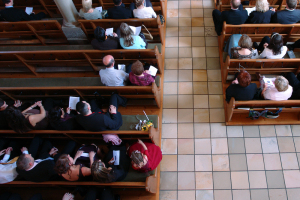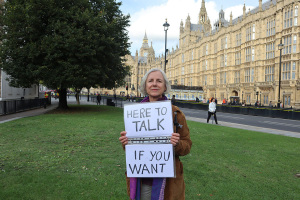Christian Philosopher Explores Causes of Atheism
James S. Spiegel has an uncomfortable thesis to propose.
He contends: Religious skepticism is, at bottom, a moral problem.
A professor of philosophy and religion at Taylor University in Upland, Ind., Spiegel has written a 130-page book, The Making of an Atheist, in response to the New Atheists. But unlike the numerous responses that have emerged from Christian apologists, Spiegel's book focuses on the moral-psychological roots of atheism.
While atheists insist that their foundational reason for rejecting God is the problem of evil or the scientific irrelevance of the supernatural, the Christian philosopher says the argument is "only a ruse" or "a conceptual smoke screen to mask the real issue – personal rebellion."
He admits that it could appear unseemly or offensive to suggest that a person's lack of belief in God is a form of rebellion. But he said in a recent interview with the Evangelical Philosophical Society that he was compelled to write the book because he is convinced that "it is a clear biblical truth."
His goal in writing the book is neither to provoke people nor show that theism is more rational than atheism. Rather, his aim is to direct people to "the real explanation of atheism."
"The rejection of God is a matter of will, not of intellect," he asserts.
"Atheism is not the result of objective assessment of evidence, but of stubborn disobedience; it does not arise from the careful application of reason but from willful rebellion. Atheism is the suppression of truth by wickedness, the cognitive consequence of immorality.
"In short, it is sin that is the mother or unbelief."
God has made His existence plain from creation – from the unimaginable vastness of the universe to the complex micro-universe of individual cells, Spiegel notes. Human consciousness, moral truths, miraculous occurrences and fulfilled biblical prophecies are also evidence of the reality of God.
But atheists reject that, or as Spiegel put it, "miss the divine import of any one of these aspects of God's creation" and to do so is "to flout reason itself."
This suggests that other factors give rise to the denial of God, he notes. In other words, something other than the quest for truth drives the atheist.
Drawing from Scripture, Spiegel says the atheist's problem is rebellion against the plain truth of God, as clearly revealed in nature. The rebellion is prompted by immorality, and immoral behavior or sin corrupts cognition.
The author explained to EPS, "There is a phenomenon that I call 'paradigm-induced blindness,' where a person's false worldview prevents them from seeing truths which would otherwise be obvious. Additionally, a person's sinful indulgences have a way of deadening their natural awareness of God or, as John Calvin calls it, the sensus divinitatis. And the more this innate sense of the divine is squelched, the more resistant a person will be to evidence for God."
Spiegel, who converted to Christianity in 1980, has witnessed the pattern among several of his friends. Their path from Christianity to atheism involved: moral slippage (such as infidelity, resentment or unforgiveness); followed by withdrawal from contact with fellow believers; followed by growing doubts about their faith, accompanied by continued indulgence in the respective sin; and culminating in a conscious rejection of God.
Examining the psychology of atheism, Spiegel cites Paul C. Vitz who revealed a link between atheism and fatherlessness.
"Human beings were made in God's image, and the father-child relationship mirrors that of humans as God's 'offspring,'" Spiegel states. "We unconsciously (and often consciously, depending on one's worldview) conceive of God after the pattern of our earthly father.
"However, when one's earthly father is defective, whether because of death, abandonment, or abuse, this necessarily impacts one's thinking about God."
Some of the atheists whose fathers died include David Hume and Friedrich Nietzsche. Those with abusive or weak fathers include Thomas Hobbes, Voltaire and Sigmund Freud. Among the New Atheists, Daniel Dennett's father died when Dennett was five years old and Christopher Hitchens' father appears to have been very distant. Hitchens had confessed that he doesn't remember "a thing about him."
As for Richard Dawkins and Sam Harris, there is very little information available regarding their relationships with their fathers.
"It appears that the psychological fallout from a defective father must be combined with rebellion – a persistent immoral response of some sort, such as resentment, hatred, vanity, unforgiveness, or abject pride. And when that rebellion is deep or protracted enough, atheism results," Spiegel explains.
In essence, "atheists ultimately choose not to believe in God," the author maintains, and "this choice does not occur in a psychological vacuum."
"It is made in response to deep challenges to faith, such as defective fathers and perhaps other emotional or psychological trials," he states. "Nor is the choice made in a moral vacuum. Sin and its consequences also impact the will in significant ways.
"These moral-psychological dynamics make it possible to deny the reality of the divine without any (or much) sense of incoherence in one's worldview."
The Making of an Atheist: How Immorality Leads to Unbelief was released in February.





























